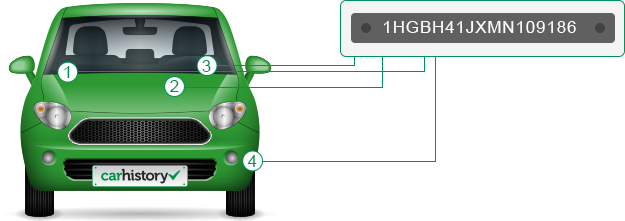
The vehicle identification number (VIN) is composed of 17 characters (digits and capital letters) that act as a unique identifier for the vehicle. A VIN displays the car's unique features, specifications and manufacturer.
The VIN can be found in a couple of places including on the car's registration label (1), on the compliance plate in the engine bay (2) or on the passenger side windshield (3), or on one of the door posts (where the door latches when it is closed) (4). See the image below:
Have you considered all the factors you need to before making a decision to buy a used car? You need to figure out exactly what you want from the vehicle, including how large, how economical and how fast it's going to be. For most of those things, you can get a great feel for the car by taking it for a test drive. You can't just inspect it and kick the tyres before heading off.
If you don't do your research before you buy, you might end up owning a car you don't like, or one that just breaks down as soon as it's in your garage or driveway1. To make an informed decision about a used car you're interested in, make sure you get a CarHistory report.
1) Select a few cars, and research them all
When you're searching around for a used car, there'll be a few that stick out as possible options. Take note of them, and keep searching. Once you've done enough looking around, you might have 10 or 15 cars that could work for you. The next step is to read online about what can go wrong with these cars, how reliable they are, how expensive they are to fix and how much fuel they use, for example1.

This process might help you to cut a few from your list, once you find out a car is going to be far more expensive to maintain than you budgeted for. That's fine - don't be put off! This is all a part of a process that's going to help you find the right car. From your smaller list, check out how they've been treated since they were bought in Australia with a CarHistory report. If you notice that an engine has been wound down to show better mileage, or it's been in a major collision, it could cut a few more options from your list.
2) Set up a meeting with the buyer, and take the car for a spin
From your even smaller list, get in touch with each of the sellers and set up a time to come and inspect the car2, and take it for a test drive. When you arrive, you'll get a good feeling about how the car has been kept by meeting the owner. If you're buying from a dealer, you won't know what the previous driver was like, though.
Go around the car looking for any damage the seller noted in the description.
Take the seller's advertisement with you for the inspection, and go around the car looking for any damage they noted in the description. You might find there's a lot more than they initially let on, which is a bad sign. Before you take it on the road, sit in the car and inspect the interior. Make sure it's in an acceptable condition, and whether or not people have been smoking in the car. If they have, it will leave a lasting smell.
3) See what the car can do
Get out on the road with the car, and see if it performs as you'd expect. Head to a highway and put your foot down - make sure it can get up to speed efficiently, and that it can stay at speed without overheating or breaking down3. Drive around town, accelerate and brake quickly, even take it to a garage for an inspection, all to make sure you're not buying a mechanically unsound machine3.

When you get back to the dealership or the home of the seller, turn the car off and let it sit for a few minutes before you finish your inspection. Check underneath for any fuel or oil leaks, and make sure the engine turns off properly when you take out the key. Remember, you don't have to make your decision on the spot - head home and think it over, after you've seen all of the potential cars.
Test driving is a vital part of the buying process, but there's no point doing that if you find a car has something dodgy lurking in its past. Get in touch with CarHistory to find that out.
1. Car and Driver. How to test drive a car. Accessed December 2016.
2. Motoring Australia. Smart Buying: Taking a new car test drive. Accessed December 2016.
3. Jalopnik: The Garage. How to test drive a car. Accessed December 2016.